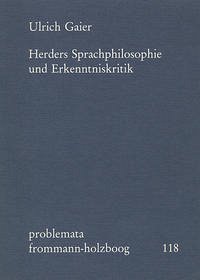Johann Gottfried Herder (1744-1803) is regarded today as one of the great initiators of most of the humanistic disciplines. His works are steeped in reflections on the philosophy of language and epistemology derived from the relationship between language and thought, and these reflections form the basis for his theories of anthropology, history, aesthetics and critique. In the introduction there is a detailed description of Herder's philosophy of language, making it more accessible than it has been up to now, followed by a summary of the linguistic reflections on anthropology in the years between 1764 and 1772. After the analysis of the 'Ursprungsschrift' (Treatise on the Origin of Language), the focus is on his dispute with Kant.Johann Gottfried Herder (1744-1803) gilt heute als der große Anreger der meisten geisteswissenschaftlichen Disziplinen. Sprachphilosophische und aus der Wechselbeziehung zwischen Sprache und Denken abgeleitete erkenntniskritische Überlegungen durchziehen sein Werk und bilden die Grundlagentheorie für seine Anthropologie, Historik, Ästhetik und Kritik. Einleitend wird Herders sprachphilosophischer Horizont breiter als bisher erschlossen, dann die Erträge aus der anthropologischen Sprachreflexion der Jahre 1764-72 zusammengefasst; nach der Analyse der Ursprungsschrift liegt der Schwerpunkt auf seiner Auseinandersetzung mit Kant.
»Die durch seine Originalität hervorgerufene Sperrigkeit gegen einzeldisziplinäre Vereinnahmungen hat Herder als weißen Fleck in der Forschung zwischen Philosophie, Germanistik, Linguistik, Historie ausgespart. Exkursionen in sein unermessliches Gedankenmassiv decken sich da meist nur für den eigenen Bedarf ein. Dagegen macht nun Ulrich Gaier überzeugend geltend, daß es Zeit wird, Herder nicht nur als systematischen Denker anzuerkennen, sondern das Potential an kritischen Argumenten und Alternativen zur kantischen und nachkantischen, d.h. auch gegenwärtigen Philosophie auszuschöpfen, das er bereithält und in dem sich mancher Moderne vorgedacht fand und finden wird.« Willi Goetschel, Lessing Yearbook

